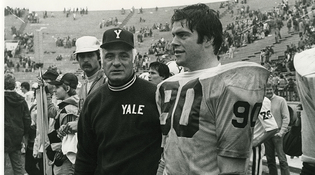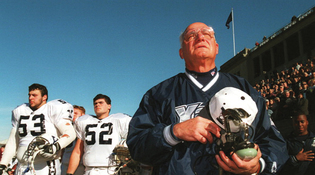 loading
loading
featuresCarm Cozza 1930–2018Yale’s longest-serving football coach never forgot his players. And they'll never forget him. Emma Span ’03 is a managing editor at the Athletic.  Sebby FrinziCoach Carm Cozza, with 1979 captain Tim Tumpane ’80, at Princeton’s Palmer Stadium. View full imageThe legendary Yale running back Calvin Hill ’69 first met Carm Cozza, then an assistant coach, when Hill and his parents traveled to New Haven in the winter of 1965 for a recruiting visit. Though Cozza had been at the school only two years, already he “seemed to be in keeping with the Yale tradition,” Hill says. Cozza, born in Parma, Ohio, in 1930, played football at Miami University of Ohio under one future Hall of Fame coach, Woody Hayes, and alongside another, Bo Schembechler. He became Yale’s head coach in 1965 after two years as an assistant, and he held that job for more than three decades. Despite “all the changes that occurred while Carm was a coach there,” says Hill, including coeducation, the civil rights movement, and the antiwar movement, “the commitment to excellence, and the idea that all Yale’s [athletic] programs were going to be consistent with the academic mission—that never changed.” Twenty-three years later, Chris Kouri ’92 met Cozza (by now simply “Coach” to nearly everyone) on his own recruiting visit. He remembers “walking into his wood-paneled office” and seeing Cozza’s “stark white hair and his physical bearing, and all the old pictures of a packed Yale bowl. I thought Wow, this is a serious football tradition.” Kouri became the fullback on Yale’s 1989 Ivy championship team. Fifteen years after that, assistant coach Tony Reno was introduced to Cozza, then 73, who had stepped down as head coach in 1996. “I remember being awestruck,” Reno says. “He said, ‘Welcome to Yale, and if you need anything let me know.’” When Reno became head coach in 2012, his first phone call was to Cozza, and Cozza remained a frequent sounding board. “When you’re the caretaker of Yale football, to have the guy who set the standard for it as your mentor is pretty incredible,” Reno says.
 Boston GlobeCozza at Harvard Stadium in 1996 for his last game as head coach. View full imageCozza, who died on January 4 at age 87 from complications of acute leukemia, entered the College Football Hall of Fame in 2002. With ten Ivy League titles and a 179–119–5 record, he remains the Ivies’ winningest coach. All told, he instructed roughly 2,000 Yale players. And they made as much of an impression on him as he did on them. “He was able to remember all these players, from 32 years of coaching, even as we got old, fat, and bald,” says former quarterback Brian Dowling ’69, another towering figure from Cozza’s first class. “He remembered everyone.” Says Kouri, “He cared about all of us. He’d answer any call, he’d assist us in our careers, he would try to open doors.” Impressive as Cozza’s on-field accomplishments were, it’s his ability to connect with people that still resonates with his former players. “Because he truly cared so much about his kids,” says Reno, “he was able to cross all different ages, generations, geographic background, race—you name it.” Dowling recalls Cozza telling him, more than once, that if he needed to take a day off practice to study as he adjusted to college, he should. He also remembers the coach personally driving a Good Humor truck onto the field one day, in lieu of the dreaded sprints that usually ended practice. Kouri was struck by the way Cozza always rushed to the side of injured players, concerned more for their health than for the score. Which isn’t to say that Cozza didn’t care about winning. After calmly addressing his team following a 1965 loss to Cornell, he went into an empty visitors’ locker room next door. For several minutes, players heard the thunderous din of metal lockers being hit with some heavy object. Then the noise stopped and Coach strode back into the room, calm once again. Cozza entertained offers from bigger programs, but according to Jean Cozza, his wife of 65 years, he never came close to leaving. “He really enjoyed knowing these boys and being close to them,” she says. “It almost was like having a lot of sons. . . . He still talked to many of the kids often.” The first of those kids will attend their 50th Yale reunion next year, while the last are already past their 20th. But on some level, they’ll always be “those kids.” And Cozza will always be Coach.
The comment period has expired.
|
|